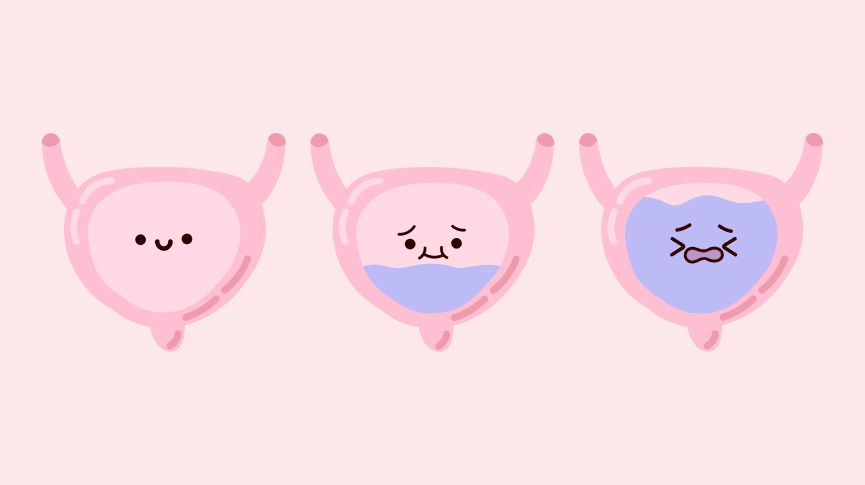Why Do I Pee So Much?

It’s one of the annoying stereotypes about women that may be true: We pee a lot. At least, most of us, and more often than men do. There are several reasons why women urinate more often on average than men, such as the placement of our internal organs (our bladder has to share space with a uterus, hello!), hormonal fluctuations, and pregnancy.
However, if you find yourself looking for the bathroom more often than normal, or if the constant need to urinate becomes inconvenient, there may be other underlying causes. Frequent urination, or polyuria, refers to the condition of having to urinate an abnormally high number of times every day.
While how often you pee varies depending on fluid intake and general physiology, the average person normally pees 6-8 times in 24 hours. If you’re going significantly more often than that, it may be deemed frequent urination.
Reasons Why You May Be Peeing A Lot
There are a variety of reasons why you may be urinating so frequently. Some of these issues are medical conditions that require treatment, while others may be attributed to lifestyle changes or medications.
If you experience frequent urination along with other concerning symptoms, or if the constant urination affects your quality of life, consult with your medical practitioner so they can evaluate your condition and get to the root of the problem.
Below are some reasons why you may be experiencing frequent urination.
You’re drinking too much water
Staying hydrated is a generally healthy behavior, but if you’re continually hydrating, your body will need to pass out the unused fluids through urine.
How much water you should drink every day depends on your environment and activity level – if you’re constantly exercising in arid, hot conditions, for example, you’ll naturally need to replenish more fluids – but if you’re peeing frequently, you may be drinking too much water.
Limiting the amount of water you drink before bed can be helpful if nighttime visits to the bathroom are disrupting your sleep quality.
You’re pregnant
Most women have heard this cliché before, but it’s true for a reason. Pregnant women tend to pee more frequently than usual because an expanding uterus puts pressure on the bladder, which in turn results in having to empty the bladder more often. Don’t be alarmed, this is a normal part of pregnancy and should go away a few weeks after you give birth.
Consuming diuretic substances (alcohol, coffee)
Substances like alcohol and caffeine act as diuretics and flush water out of your system. Such substances also curtail your body’s production of a hormone called vasopressin. Vasopressin signals your kidneys to release more water to your body rather than sending it directly to your bladder.
To stay hydrated, sip water while enjoying your alcoholic drink. Caffeine can also have diuretic effects, but you’ll need to drink substantially more coffee for it to affect you like alcohol.
A Urinary Tract Infection (UTI)
Up to 40% of women will develop an urinary tract infection (UTI) at some point in their lives. UTIs occur when bacteria infects the urinary system, which includes the urethra, bladder, and kidneys. Signs of a UTI include frequent urination, a burning feeling when you pee, discolored urine, fever, and feeling like you need to pee constantly.
Diabetes (Type I and Type II)
Both Types I and II diabetes raise your blood sugar, causing your kidneys to try and filter it out. When it cannot fully do so, the sugar ends up in your urine, drawing more water from your body and forcing you to pee more. Frequent urination is a common sign of early-stage diabetes and should be discussed with your doctor.
Diabetes Insipidus
This is unrelated to type 1 or type 2 diabetes. Diabetes Insipidus occurs when your body is unable to use, or make enough, vasopressin (the hormone that signals your kidneys to release water into your blood). You may feel nauseated, tired, confused, and extremely thirsty. This condition can be managed with medication.
Kidney stones
Over time, minerals and salts can accumulate into tiny rocks in your kidney. Kidney stones typically make you feel like you have to go all the time but can’t pee much. Other symptoms include fever, nausea, chills, and waves of severe back and side pain. Consult with your doctor; the stones may come out by themselves, or may require surgery.
Vaginitis
When your vagina gets infected and inflamed from bacteria, yeast, medication, viruses, or hormonal changes, you may feel like you need to pee more often. Chemical irritants in clothes, sprays, or creams may also inflame the vagina. Symptoms include pain and itching during urination and sex. There may also be a smell or discharge.
Certain medications
Certain medications such as Adderall (ADHD medication) may have a diuretic effect and induce frequent urination.
Menopause
During menopause, your body’s estrogen levels drop, which can make you need to pee more. This may be treated with diet and lifestyle changes or hormone replacement therapy.
Constipation
Severe constipation, aka if you haven’t pooped in a while, fills up your bowels so much that it pushes on your bladder and makes you feel like you need to pee more frequently. Moreover, constipation can exacerbate the urge further by weakening the pelvic floor muscles that control the bladder and bowel.
Tumor
Tumors near the bladder or urethra may make it painful to urinate, or make you go more often. This is extremely rare, but you should immediately consult a doctor if you see blood in your urine, feel a lump in the lower stomach, or notice pain when you pee.
Painful Bladder Syndrome
Painful bladder syndrome causes you to feel the urge to urinate without being able to let much out. Other symptoms include pain in the lower abdomen that worsens after sex or urination.
This condition, also known as interstitial cystitis, tends to occur when the bladder tissue becomes swollen and sensitive, though scientists haven’t pinpointed an acute reason. It may be treated with medication, diet and exercise, surgery, and physical therapy.

Clara Wang is a freelance writer based in Nashville, TN but often found abroad. She mostly muses about the three best things in life: Food, sex, and music. Her work has been featured in publications such as Eater Austin, Eater Nashville, Giddy, Buzzfeed, Refinery29, the Austin Chronicle, the Austin American Statesman, and the Daily Dot.


